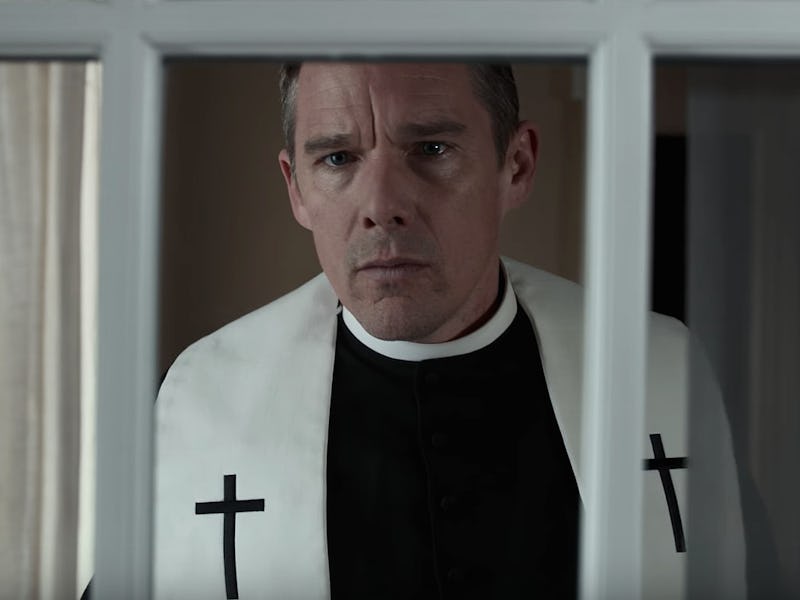Before he was a religious fanatic on Moon Knight, Ethan Hawke led a God-fearing thriller
As big-budget films use climate change as an excuse for spectacle, director Paul Schrader digs into its effect on the human heart.

If his string of writing and directing credits in the ‘70s and ‘80s didn’t make it obvious enough, Paul Schrader has a lot of thoughts about where we’re headed, both literally and theologically. Raised in a Calvinist household so strict that he didn’t see his first film until he was a teenager, Schrader has written dialogue for some of the most complex and troubled figures in cinematic history, including Travis Bickle, Jake LaMotta, and even Jesus Christ himself.
The connective tissue in these examples is a frustrated disillusionment that threatens to spill over into violence or irreconcilable alienation. Schrader frequently finds intrigue in characters wrestling with a shifting moral tide, because being raised religious tends to paint a changing society in spiritual shades of good and evil. Many of his films come across as personal, but First Reformed feels like Schrader at his most vulnerable: Tortured, wistful, uncertain.
Part of why the movie feels so transparent is because it’s a deeply familiar framework, one that borrows from Schrader’s films and inspirations. According to Schrader, the screenplay combines the lead of Robert Bresson’s Diary of a Country Priest with the intense, schizophrenic narration of Taxi Driver. The result is a suffocating character study about Reverend Ernst Toller (Ethan Hawke), the pastor of New York’s historic First Reformed Church, as he disappears into a black hole of existential terror and theological anxiety after a life-changing encounter with a climate change activist.
Hawke gives one of the best performances of his career, which is essential because so much of the film is dedicated to locking us alone in a room with Toller, his journal, and his dark thoughts. We know he’s struggling with his faith in the face of senseless tragedy –- his son was killed in Iraq after Toller encouraged him to enlist, and he’s now suffering from what appears to be stomach cancer.
Don’t let the weird lamp distract you from Ethan Hawke’s masterful performance.
The many faces he hides behind expose the contradictions in his beliefs. For every fake smile he gives the staff at Abundant Life, the nearby megachurch owned by Pastor Joel Jeffers (played by a surprisingly measured Cedric the Entertainer), Toller sinks deeper into his despair, inflicting it on himself like self-flagelation in the hope it will bring him closer to God. Alexander Dynan’s camerawork traps Hawke in tight close-ups, boxing us in with the reverend’s splintering psyche.
Toller’s angst is palpable, and it only gets worse after he’s called by a woman named Mary Mensana (Amanda Seyfried) to counsel her husband Michael (Phillip Ettinger), a climate activist who’s become despondent thanks to the looming consequences of global warming. One of the best scenes of Schrader’s career is the first encounter between Ernst and Michael, a philosophical danse macabre between two disillusioned men debating whether there’s still good to be found in a world so threatened by the shackles of greed. There’s a genuine sense of urgency to how Schrader writes about the issues, and you can tell this conversation is one he’s had with himself.
Speaking to Variety in 2017, Schrader said, “Anyone who is optimistic at this moment hasn’t been paying attention.” Considering the projections scientists have been making, he’s probably right. Reports from the World Meteorological Organization say the past seven years have been the warmest on record, and there’s a 93% chance that 2022 through 2026 will be hotter than the last five years. We already felt the effects this year, from a European heat wave to monsoon floods in Pakistan.
Nature looms over First Reformed.
By all accounts, these issues will continue to grow worse unless governments make drastic changes, but capital stands in the way. One of the most blistering and infuriating moments comes when Reverend Toller expresses his belief that climate activism is a matter of church stewardship, only to be shut down by Edward Balq (Michael Gaston), a church financier who’s also one of the city’s biggest industrialists. This stonewalling can produce the crushing existential futility felt by Toller and Michael; observe the self-martyring suicides of climate change activists David Buckel in 2018 and Wynn Bruce earlier this year.
The temptation of despair is felt in many of the spiritualist films Schrader turned to for inspiration, as is a fear of the wickedness and fleeting nature of the physical world. Like many of those works, First Reformed explores a desire to escape suffering through spiritual transcendence, a concept Schrader explored back in a 1972 book about cinema’s take on superseding the physical through a ritual of closeness to God.
Throughout First Reformed, Reverend Toller yearns for a sign of divinity to give him purpose, to bring him closer to the spiritual and transcend his suffering. In a lesser Christian movie, the path would be revealed to him, and his depression and doubt would evaporate. But the brilliance of First Reformed is in how Schrader and Hawke invite audiences to decide where Toller will find his salvation — in his relationship with the people around him, or in something dark and self-destructive.
First Reformed is streaming on Amazon Prime.